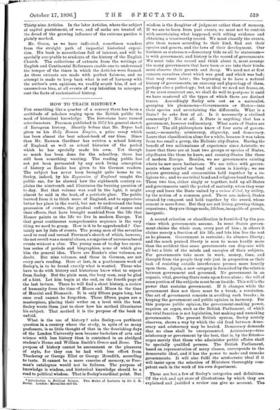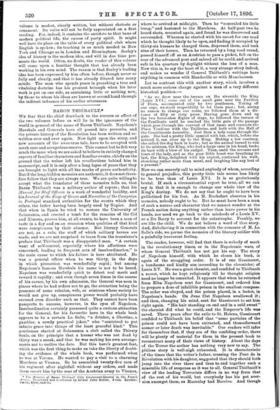HOW TO TEACH HISTORY.* FOR something like a quarter of
a century there has been a multitude of scholars urging upon the British public the need of historical knowledge. The historians have turned schoolmasters. Freeman published in 187:2 his general sketch of European history. Shortly before that Mr. Bryce had given us his Holy Boman Empire, a prize essay which has been almost the best school-book of our time. Since then Mr. Rawson Gardiner has written a school history of England as well as school histories of the period which he has specially made his own. Yet though so much has been done for the schoolboy, there has still been something wanting. The reading public has not yet been permeated by any such living conception of history as Ranke has given to his German readers. The subject has never been brought quite home to us. Seeley, indeed, by his Expansion of England caught the public ear, for he showed how the eighteenth century ex- plains the nineteenth and illustrates the burning question of to-day. But that volume was read in the light, it might almost be said in the heat, of a patriotic glow. The public learned from it to think more of England, and to appreciate better her place in the world, but not to understand the long procession of events, the gradual unfolding of causes and their effects, that have brought mankind from the life that Homer paints to the life we live in modern Europe. Yet that great continuous comprehensive sequence is the very thing we need to grasp. How is it to be apprehended ? Cer- tainly not by lists of events. The young men of the seventies used to read and reread Freeman's sketch of which, however, the net result was a mental chaos, a congeries of unremembered events without a clue. The young man of to-day has count- less series of periods and biographies, none of which give him the general idea. There are Ranke's nine volumes, no doubt. But nine volumes, and those in German, are not every one's reading. Here at last, in a posthumous work of Seeley's, is to be found exactly what is wanted. Those who have to do with history and historians know what to expect from Seeley. But the plain man, the busy man, may be glad of a hint. Let him begin at the end, on the fourth page of the last lecture. There he will find a short history, a review of humanity from the time of Moses and Minos to the time of Mazzini and Bismarck. It is only fifteen pages long, but once read cannot be forgotten. These fifteen pages are a masterpiece, placing their writer on a level with the best. Seeley wrote them just to show how his method illuminates his subject. That method it is the purpose of the book to unfold.
What is the use of history ? asks Seeley,—a pertinent question in a country where the study, in spite of so many professors, is so little thought of that in the flourishing days of the London University men became bachelors of arts and science with less history than is contained in an abridged student's Hume and William Smith's Greece and Rome. The purpose of history cannot be amusement or the pleasures of style, for they can be had with less effort from Thackeray or George Eliot or George Meredith, according to taste. It cannot be a mere exercise of memory, or Free- man's catalogues would not be failures. The purpose of knowledge is wisdom, and historical knowledge should be a road to political wisdom. That is Seeley's cardinal point. But
• Introduction to Political Science. Two Series of Lectures by Sir J. B. Seeley. London: Macmillan and Oa
wisdom is the daughter of judgment rather than of memory. If we are to learn from past events, we must not be content with ascertaining what happened, with sifting evidence and obtaining a trustworthy record. We must classify the events, give them names according to their kind, find out their species and genera, and the laws of their development. Our business as statesmen—democracy bids us all be statesmen— is with government, and history is the record of governments. We must take the record and think about it, must arrange the many governments that have been or are into their kinds, must observe their growth and decay. We need not at first concern ourselves about which was good and which was bad ; that may come later ; the beginning is to have a natural history of governments, an anatomy and physiology of them, perhaps also a pathology ; but an ideal we need not frame, or, if we must construct one, we shall do well to postpone it until we have mastered all the types of which there are distinct traces. Accordingly Seeley sets out as a naturalist, grouping his phenomena—Governments or States—into their species and ascertaining the differentia. What is a State P he asks first of all. Is it necessarily a civilised community ? Not at all. A State is anything that has a government, however rudimentary. What sorts of States are there? The old philosophers know of four sorts of govern- ment,—monarchy, aristocracy, oligarchy, and democracy. Leave that classification alone for a while, because it was taken from too small a group, the Hellenic city-States. Having the benefit of two millenniums of experience since Aristotle, we know that there are at least two groups or species of States, city-States like those he knew, and country-States like those of modern Europe. Besides, we see governments existing where he saw mere barbarians. We see tribes with govern- ments whose symbol or bond of union is kinship ; we see priests governing and communities held together by a re- ligious tie ; and we see tribal bond and religious bond together. These two ties, either singly or together, hold up all States and governments until the period of maturity, when they wear away and leave the State united by a raison d'etat, by utility, by the notion of a common good. There are, indeed, States created by conquest and held together by the sword, whose cement is mere force. But they are not living, growing things, organisms ; they are things made, lifeless, incapable of growth, inorganic.
A second criterion or classification is furnished by the pro- vince which governments assume. In some States govern- ment claims the whole man, every part of him ; in others it claims merely a fraction of his life, and lets him live the rest as he pleases. Government is restraint; its absence liberty; and the mach praised liberty is seen to mean hardly more than the accident that some governments can dispense with all but a little of the minds and energies of their subjects. For governments take more in work, money, time, and thought from the people they rule just in proportion as their task of resisting outside interference presses more heavily upon them. Again, a new category is furnished by the relation between government and governed. No government in an organic, vital, growing State rests upon force alone; the will of some portion of the subjects must be on its side. This will is the power that sustains government. If it changes while the government does not there must be a break, a revolution. One art of government consists in avoiding such breaks ; in keeping the government and public opinion in harmony. For this purpose public opinion, the government-making power, requires an organ, such as the British Parliament, of which the vital function is not legislation, but making and unmaking governments. The present British system, Seeley acutely observes, shows a way by which the old feud between demo- cracy and aristocracy may be healed. Democracy demands that no class shall be unrepresented. Aristocracy—true aristocracy or government by the best, that is, by the fittest— urges merely that those who administer public affairs shall be specially qualified persons. The British Parliament, based on representation of many classes, corresponds to the democratic ideal, and it has the power to make and unmake governments. It will also fulfil the aristocratic ideal if it will insist upon the selection of Ministers thoroughly com- petent each in the work of his own department.
These are but a few of Seeley's categories and definitions. Of the rich and apt store of illustrations by which they are explained and justified a review can give no account. The
volume is modest, clearly written, but without rhetoric or ornament. Its value will not be fully appreciated on a first reading. For, indeed, it contains the antidote to that bane of modern political life, the excess of party spirit. It might well have its place on the table of every political club where English is spoken ; its teaching is as much needed in New York and Chicago as in London and Birmingham. Seeley's idea of history is the modern idea, and will in due time per- meate the world. Often, no doubt, the reader of this volume will come upon a familiar thought that has already been working in his own mind. The reason is that Seeley's leading idea has been expressed by him often before, though never so fully and clearly, and that it has already filtered into many minds. The man who spends years in preaching a true and vitalising doctrine has his greatest triumph when his later work is put on one side, as containing little or nothing new, by those to whom his ideas are known at secondhand through the indirect influence of his earlier utterances.







































 Previous page
Previous page